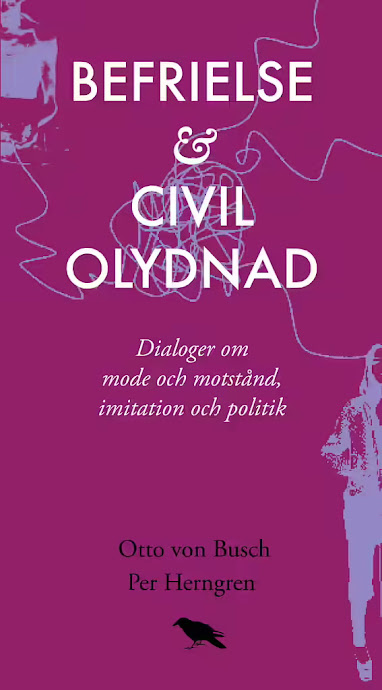Tillsammans skapade kapitalism och protestantism en ensam och tung individualism. Det är inte främst en egoistisk individualism utan snarare en uppoffrande individualism. Kapitalism skapar moral. Enligt psykologen Erich Fromm genererar denna uppoffrande moral ofta febril aktivitet.
Strävan att göra något, hjälpa till är en hybrid av protestantism och kapitalism. Individen, deras gemensamma avkomma, känner sig obetydlig och tyngs av bördan att hen borde ställa upp. Hen tar sig ur hopplösheten genom att göra sig upptagen.
"the feeling of powerlessness and insignificance, ... represent a state of mind ... One possible way to escape this unbearable state of uncertainty and the paralysing feeling of one's own insignificance is the very trait which became so prominent in Calvinism: the development of a frantic activity and a striving to do something." (Fromm, Escape from freedom, p 78-79)
Vinst och asketism
I och med bonus och vinster förknippar vi gärna kapitalism med överflöd, rofferi och tjuveri. Men överflödet gäller bara vissa. Arbetarklass och lägre medelklass lär av kapitalismen att leva ett uppoffrande liv: ett liv ägnat åt lönearbete, stat, nation, egna hem, familj, banklån, besparing. Denna asketism har kapitalismen tagit över från protestantismen.
"Besides the affirmation of the individual which capitalism brought about, it also led to a self-negation and asceticism which is the direct continuation of the Protestant spirit." (Fromm, Escape from freedom, p 94-94)
Ömsesidig förstärkning
Kapitalism och protestantism är ett motvilligt par och deras relation kommer mer ur resonans mellan dem än gemensamt syfte. Genom att kapitalism och protestantism hamnar i resonans börjar de oavsiktligt förstärka olika saker hos varandra.
Även kristen antikapitalism hamnar lätt i resonans med kapitalism. Ett exempel är när radikala kristna individuellt ska leva enkelt, istället för att experimentera med, och bygga upp, olika former av gemensam, solidarisk ekonomi och egendom. Ansträngningarna att som enskilda leva enkelt, ickekonsumistiskt och klimatsmart förstärker kapitalismens individualism: en individualism som lägger bördan på individen. En individualism som använder även fritiden till att göra sig upptagen istället för att bygga befriande förändring.
"In Calvinism this meaning of effort was part of the religious doctrine. Originally it referred essentially to moral effort, ... These considerations show that the compulsion to unceasing effort and work was far from being in contradiction to a basic conviction of man's powerlessness; rather was it the psychological result. Effort and work in this sense assumed an entirely irrational character. They were not to change fate" (Fromm, Escape from freedom, p 80)
Per Herngren
2013, version 0.1
2013, version 0.1
Referens
Erich Fromm, Escape From Freedom, New York: Henry Holt and Company, 1941, Owl Books Edition 1994.
Bilaga
Kapitalism och kyrkor producerar negativ frihet
Kapitalism gör, tillsammans med flera kyrkor, individen fri från gemenskapens krav. Det är en frihet-från snarare än en positiv befriande frihet. Individen blir själv ansvarig för sitt öde. Genom att kapitalism och protestantism samtidigt producerar uppoffring görs även individen ansvarig för jobb, samhälle och ekonomi. Individen blir dessutom ansvarig för världen: fattigdom, klimatpåverkan och miljöförstöring.
"the general characteristics of capitalistic economy: the principle of individualistic activity. In contrast with the feudal system of the Middle Ages under which everybody had a fixed place in an ordered and transparent social system, capitalistic economy put the individual entirely on his own feet. What he did, how he did it, whether he succeeded or whether he failed, was entirely his own affair. That this principle furthered the process of individualisation is obvious and is always mentioned as an important item on the credit side of modern culture. But in furthering "freedom from", this principle helped to sever all ties between one individual and the other and thereby isolated and separated the individual from his fellow men. This development had been prepared by the teachings of the Reformation." (Erich Fromm Escape from freedom p 93-94)







